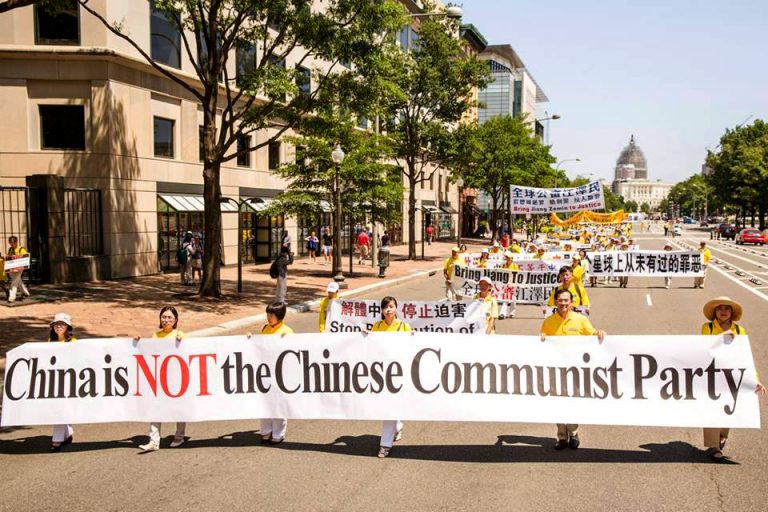A July 3 open letter addressed to President Donald Trump and Congress has fuelled public debate about the methods and goals of Washington’s standing policies toward China.
In China is not the enemy, published by The Washington Post, five prominent academics and former diplomats slammed the Trump administration for causing a “growing deterioration in U.S. relations with China,” while arguing that the authoritarian communist state and the world’s second-largest economy was not “an economic enemy or an existential national security threat.”
Other China-watchers, however, have offered criticism of the letter for the oversight of conflating China and its government with the Chinese Communist Party (CCP) regime. On July 18, The Journal of Political Risk published Stay the Course on China: An Open Letter to President Trump, penned by retired U.S. Navy Captain James E. Fanell.
“Over America’s exceptional history, successive generations have risen to the challenge of protecting and furthering our founding principles, and defeating existential threats to our liberties and those of our allies,”the letter begins.
“Today, our generation is challenged to do the same by a virulent and increasingly dangerous threat to human freedoms — the Chinese Communist Party (CCP) through the nation it misrules: the People’s Republic of China [PRC].”

The photo shows Chinese plainclothes police in Tiananmen Square stamping on the face of a man for protesting the communist regime’s persecution of the Falun Gong spiritual practice. (Image: Minghui.org)
Success
You are now signed up for our newsletter
Success
Check your email to complete sign up
The letter has also been signed by more than 150 China hands and other distinguished figures, who, according to the text, “are encouraged by the broad and coherent strategy of robust, alternative policies you have adopted to confront the PRC’s campaign to undermine the national interests of the United States and its allies.”
‘Not a matter of semantics’
In March 2018, Trump began a trade war by levying tariffs on Chinese imports, raising the bar that summer and September, then again this May after a breakdown in trade negotiations, extending 25 percent tariffs to over US$250 billion worth of Chinese goods.
Meanwhile, the U.S. government has stepped up measures to counter Chinese intellectual property theft and violations of international sanctions. Trump administration officials have spoken out with increasing frequency about the Communist Party’s human rights abuses, particularly its persecution of religious groups.
“We firmly support the Chinese people, the vast majority of whom want to live peaceful lives,” Fanell wrote in Stay the Course on China. “But we do not support the Communist government of China.”
In recent decades, the CCP’s adoption of market reforms that saw its economy break double-digit growth for years on end has fostered a narrative that China is no longer a communist country.

In recent decades, the CCP’s adoption of market reforms that saw its economy break double-digit growth for years on end has fostered a narrative that China is no longer a communist country. (Image: Screenshot / YouTube)
However, a deeper understanding of China’s political system reveals the continued impact that communist ideology and authoritarianism has on China and the world.
“This is not a matter of semantics, but arguably the most important distinction to make concerning U.S. policy on China,” three staff members of the New York-based consultancy SinoInsider wrote in their own rebuttal to China is not an enemy on July 8. The CCP “clings to the Marxist-Leninist ideology and does not represent the Chinese civilization and people.”
The SinoInsider article quotes Confucius on his principle of zheng ming (正名), or the Rectification of Names, to illustrate the shortcomings of open letter that criticizes Trump: “If names cannot be correct, then language is not in accordance with the truth of things. And if language is not in accordance with the truth of things, affairs cannot be carried on to success,” Confucius said.
Among the SinoInsider authors is Chu-cheng Ming, professor emeritus in the political science department of National Taiwan University, which is Taiwan’s most prestigious academic institution.
In the 40 years since the normalization of Sino-U.S. relations, the researchers note, the CCP has not taken greater steps toward liberalizing Chinese society or its political system. Instead, it has leveraged its strengths to expand its influence abroad by subverting democratic institutions and supporting authoritarian, sometimes pariah regimes.
“We concur that China is not the enemy,” the SinoInsider rebuttal reads. “But the same cannot be said of the Chinese Communist Party.”
In contrast to the traditional values of Chinese civilization, which are “receptive to freedom, democracy, and rule of law,” as demonstrated by the societies of Hong Kong and Taiwan, “the CCP promotes a culture of struggle, deception, corruption, and authoritarianism in China, and even exports its malign values abroad,” SinoInsider writes. “To come up with a realistic appraisal, the co-authors must first distinguish between China and the Chinese Communist Party.”
The real ‘clash of civilizations’
The Washington Post open letter describes the Trump administration’s actions as “efforts to treat China as an enemy and decouple it from the global economy,” and warns that if “the United States presses its allies to treat China as an economic and political enemy, it will weaken its relations with those allies and could end up isolating itself rather than Beijing.” It also cast doubt on the view that Chinese leaders intend to “replace the United States as the global leader,” saying that it is “not clear that Beijing itself sees this goal as necessary or feasible.”

China’s Belt and Road Initiative (BRI) is a bid to expand Beijing’s influence throughout Eurasia and the world. (Image: Screenshot / YouTube)
The SinoInsider analysts criticized the letter’s logic, saying that it boiled down to telling the Trump administration to use old and failed strategies of appeasing the CCP in hopes that it would conform to U.S. interests and international norms: “The engagement strategy has not shifted CCP behavior over the past four decades towards a more liberal direction. If anything, the Chinese communist regime is stepping up ideological indoctrination and persecution at home, as well as economic and military expansionism abroad.”
Sinoinsider also warned about argumentation that plays up the CCP’s preferred narrative of a racist “clash of civilizations,” according to which the United States is unfairly keeping China from improving its lot as a nation.
“Playing the race card allows the Communist Party to deflect attention from itself and deter foreign governments who wish to stay ‘politically correct’ from pressing the Chinese communist regime to cease its malicious actions,” Sinoinsider wrote.
The analysts noted that Chinese foreign ministry spokesperson Geng Shuang expressed support for the “objective, rational, accommodating voices” in the letter condemning Trumps’ policies.
“Not distinguishing between China and the CCP feeds into the Communist Party strategy of deliberately conflating the two concepts to devise more effective propaganda and influence operations,” SinoInsider wrote.
According to the analysis, “the central ‘clash of civilizations’ today is not between China and the West, but between the CCP and China’s 5,000-year-old civilization.”
Follow us on Twitter or subscribe to our weekly email














